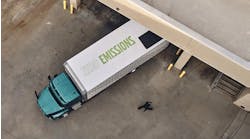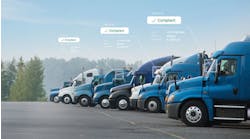In its quest to be the greenest company possible, Seattle, WA-based Essential Baking Co. didn't let one roadblock stop it from trying again. The company, which produces breads, pastries and desserts, operates a pair of cafés and sells its baked goods wholesale to restaurants and institutions, wanted its fleet of vehicles as environmentally friendly as possible.
So the company tried a test running B99 biodiesel, which went over as well as overcooked bread. A switch of biodiesel providers, however, made all the difference. A second test in the spring of 2008 produced positive results. While the company isn't currently running B99, opting instead for the more cost-efficient B20 blend, director of sales and marketing Anna Li says Essential (www.essentialbaking.com) would not hesitate to run B99 again.
“I have to give International Leasing a lot of credit,” she says of their leasing company. “They weren't too happy with the fact that the first test didn't go well. And I have to give them credit for the fact that they let us do it again.”
Responsible for the maintenance on the vehicles, Seattle-based International (www.internationaleasingco.com) was a little hesitant to approve a second test of B99. “We met with the folks from Propel. They showed us the product; they showed us the test results and samples in a very professional way,” says Todd Daniels, fleet manager for International.
The first test produced numerous operational issues on the fleet's Sprinter test vehicles. The second test, using biodiesel supplied by Propel, produced a completely different result. “The vehicles ran fine, the drivers liked the vehicles, and we had no cold-weather issues,” says Jeff Stephens, director of science and technology for Propel (www.propelfuels.com). “We were confident the quality [of the B99] was where it should be.”
The test ran for four months, covering 37,000 mi. and using 2,500 gals. of canola-based B99.
According to Propel, although temperatures dipped below 35 deg. F on 32 days during the study, there were no problems. Following the study, Propel calculated the effects of the B99 on the six test vehicles, indicating a reduction of 43,000 lbs. of CO2, a 78% reduction in particulate matter, and a 60 to 90% cut in harmful air toxins.
Essential Baking was so pleased with the results that Propel researched ways to cut the cost difference of B99, which can run 25% or more above diesel prices. “It's a fairly significant price difference,” Stephens says. When no incentives were found, Essential made the decision to run its vehicles on Propel's B20 blend, still a little more expensive than diesel but a cost Essential could handle.
“Our industry as a whole has had problems because of the [rising] prices of flour and grain, so combine the two” and the decision was made to run the less-expensive B20 blend, Li says, mentioning that the price difference is the main reason Essential is not running B99 now. “We try to be very green. We're largely organic,” she says.
Propel has seen many of its customers, who range from the self-employed to small fleets like Essential's 13-vehicle operation, choose B99 because of its green properties.
The company, which buys most of its feedstock locally, offers a free program called Clean Drive. “It's really a program that lets fleets track their [environmental impact],” Stephens says.
For their part, Daniels says International encourages clients to run a biodiesel blend whenever possible. In fact, Daniels says he'd have no problem with another fleet running a biodiesel blend, as long as it's from Propel, the only company International recognizes as a suitable supplier of biodiesel for its vehicles.


